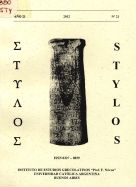Please use this identifier to cite or link to this item:
https://repositorio.uca.edu.ar/handle/123456789/4941| Título: | Atque tu qui fueris et qui nunc sis meminisse tu memineris : memoria e identidad en Captiui | Autor: | Suárez, Marcela A. Vázquez, Romina L. |
Palabras clave: | LITERATURA LATINA; COMEDIA; Plauto, ca. 254-184 a. C.; ANALISIS LITERARIO; MEMORIA; IDENTIDAD | Fecha de publicación: | 2012 | Editorial: | Universidad Católica Argentina. Facultad de Filosofía y Letras. Instituto de estudios grecolatinos "Prof. F. Nóvoa" | Cita: | Suárez, Marcela A., Romina L. Vázquez. “Atque tu qui fueris et qui nunc sis meminisse tu memineris : memoria e identidad en Captiui” [en línea]. Stylos, 21 (2012). Disponible en: https://repositorio.uca.edu.ar/handle/123456789/4941 | Resumen: | Resumen: dentro del corpus plautino, Captiui ha merecido diversos juicios y es, de todas las comedias del sarsinate, la única que por su seriedad, su intención moral y su tono trágico, merecería llevar el calificativo de “tragicomedia”. Tal como los críticos han señalado, los caracteres apelan a lo largo de toda la obra a un entramado de conceptos morales, sociales y políticos específicamente romanos. Desde el punto de vista dramático, el aspecto más importante de la pieza es el planteo y la ejecución del intercambio de identidades de los jóvenes protagonistas, que se articula en el Acto II, para favorecer a un personaje que lo necesita. Dicho acto, reservado para el engaño metateatral, se caracteriza por el predominio de términos como fides, beneficium, honor, gratia, entre otros, y este es el aspecto mayormente estudiado por la crítica. Sin embargo, el estudio del léxico permite detectar a su vez otro campo: el de la memoria. A partir del análisis lexical, se deduce que, en esta comedia, la memoria, por un lado, garantiza el éxito del metateatro y, por otro, se presenta como un elemento identitario y un agente social. Abstract: Within the theatre of Plautus, Captiui has earned various trials and is the only one which by its seriousness, its moral intention and its tragic tone, deserves to wear the label of “tragicomedy”. As critics have pointed out, throughout the play, the characters appeal to the specifically Roman moral, social and political concepts. From the dramatic point of view, the most important aspect of the piece is the approach and the implementation of the exchange of identity of the young protagonists, which is articulated in Act II, for a character you need. Such an Act, reserved for the metatheatrical deception, is characterized by the predominance of terms such as fides, beneficium, honor, gratia, among others, and this is the aspect mostly studied. However, the study of the lexicon can detect at the same time another field: that of memory. Based on lexical analysis, it follows that, in this comedy, memory guarantees the success of the metatheatre and is presented as an identity´s element and a social agent. |
URI: | https://repositorio.uca.edu.ar/handle/123456789/4941 | ISSN: | 0327-8859 | Disciplina: | LITERATURA | Derechos: | Acceso Abierto | Fuente: | Stylos, nº 21, 2012 |
| Appears in Collections: | STY - 2012 nro. 21 |
Files in This Item:
| File | Description | Size | Format | |
|---|---|---|---|---|
| memoria-identidad-captiui-suarez.pdf | 163,4 kB | Adobe PDF |  View/Open |
Page view(s)
77
checked on Apr 30, 2024
Download(s)
53
checked on Apr 30, 2024
Google ScholarTM
Check
This item is licensed under a Creative Commons License

